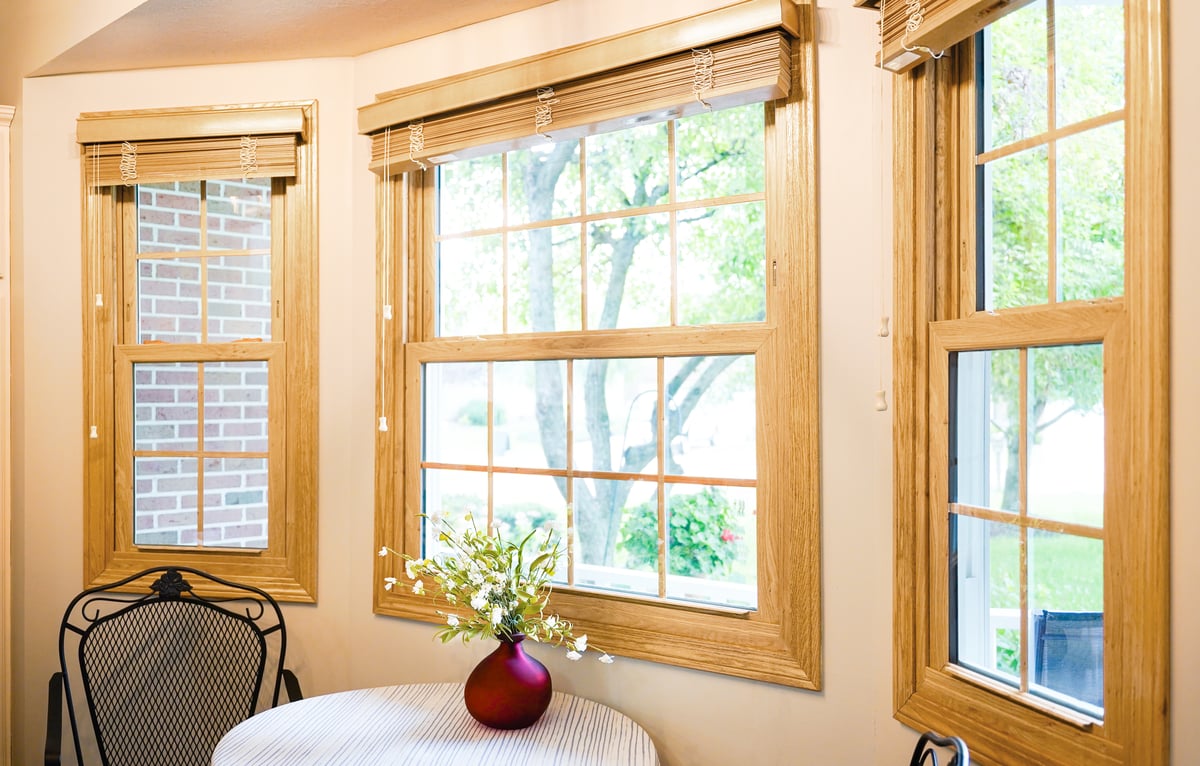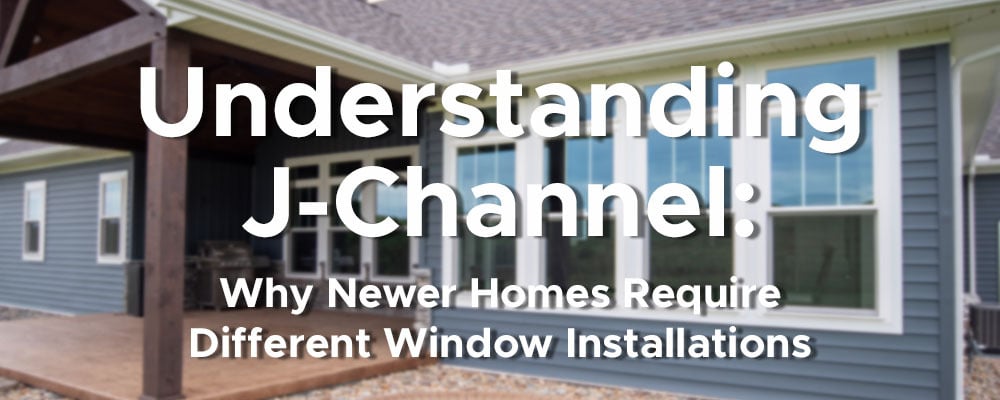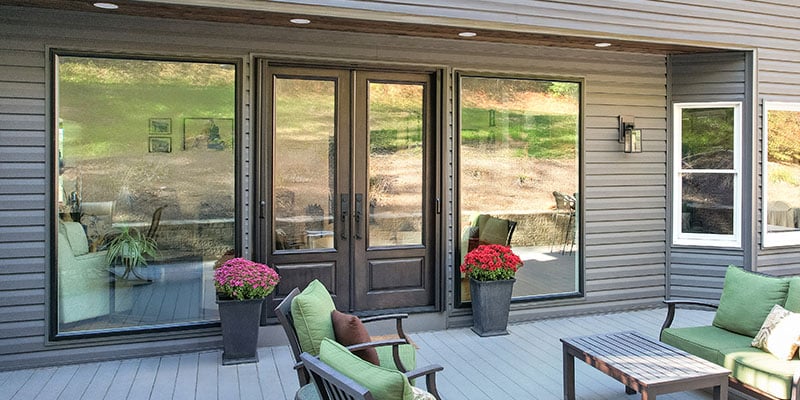Pittsburgh Replacement Window Warranties: A Homeowner’s Guide
June 30th, 2025
7 min read

When Pittsburgh homeowners invest in new windows, it’s easy to focus on the fun stuff—style, energy efficiency, and quick installation. But here’s what too many people overlook: the fine print in your window warranty. Does “lifetime warranty” really cover your lifetime? And who is the person to reach out to when something goes wrong with your windows?
At Energy Swing Windows, we’ve spent years helping homeowners in Pittsburgh understand what’s truly covered (and what’s not) in their window warranties. We’ve reviewed countless warranties and guided customers through real-life claims, so we know exactly where the pitfalls are.
In this guide, we’ll break it all down: what different types of window warranties really cover, how to read the fine print, which warranty red flags to watch out for, and how to protect yourself before you sign on the dotted line.
What Is a Replacement Window Warranty? (And Why It Matters for Pittsburgh Homeowners)
A window warranty is a written promise that outlines what is covered if something goes wrong with your windows… and what is not covered.
A “LIFETIME WARRANTY” headline does not always mean that all aspects of the product, installation, and service are covered for life. The specific terms, limitations, and exclusions are detailed in the fine print, which should always be reviewed carefully.
It’s also important to understand who is responsible if an issue arises.
Often three different parties may be involved:
- The company you signed the contract with
- The window manufacturer
- And the people installing your windows
The warranty should clearly state which party is responsible for resolving specific types of issues.
The fine print will also explain what is covered, for how long, by whom, and what is not covered.
In Pittsburgh’s climate, where windows are exposed to a full range of seasonal conditions, understanding your warranty helps ensure you know what protection you have if problems occur.
Categories in Replacement Window Warranties: What’s Covered and Who Covers It?
Window warranties aren’t one-size-fits-all. There are important categories covered within most window warranties. Understanding each kind of coverage helps you avoid finger-pointing between companies if something goes wrong.
| Warranty Coverage | What It Covers | Watch Outs |
|---|---|---|
| Manufacturer’s Warranty | Defects in materials or product performance | Often excludes labor and installation issues |
| Installation Warranty | Quality of the window install itself | Usually provided by the contractor, not the manufacturer |
| Labor Warranty | Cost of fixing or replacing parts post-installation | May be short-term or non-existent |
| Glass Breakage Warranty | Accidental breaks (e.g., baseball or lawn debris) | Usually excludes acts of nature like tornadoes |
| Transferable Warranty | Allows warranty to transfer to the next homeowner | May only transfer once or require a fee |
It’s common for both, all the above categories to be covered, or many of them to be excluded, in a single warranty. This can lead to confusion and misinterpretation.
For example, if your window seal fails and it's deemed an “installation error,” the manufacturer likely won't cover it. And if your installer doesn’t offer a labor warranty? You're stuck.
Knowing what items in a warranty is covered and by whom is key, but so is knowing how long that coverage will actually last. Here’s what to expect.
How Long Will Your Pittsburgh Window Warranty Actually Protect You?
Here’s where it gets tricky. Most window warranties use terms like “limited lifetime,” but what does that even mean?
- Lifetime: This does not mean unlimited coverage. Every warranty is “limited” in some way—by time, parts, or conditions.
- 10–20 Years: Some warranties break it down even further. 10 years for glass, 20 years for frames, 2 years for labor, etc.
Many manufacturers offer different warranty lengths depending on the product line. For example, ProVia windows may have different product coverage than other brands. Remember, a manufacturer’s warranty only covers the details of the product, not the installation or the cost of having someone service the window.
Always read the details and ask the right questions.
- What’s actually covered for a “lifetime”?
- Who is covering the warranted items?
- Is anything prorated after a certain time?

Prorated warranties reduce coverage over time because manufacturers assume your window has already delivered part of its lifespan. So if your warranty lasts 20 years but your window fails in year 10, you might only be reimbursed for 50% of the replacement cost.
Of course, time isn’t the only factor. It’s just as important to understand exactly what’s covered and what isn’t.
What Is (and Isn’t) Covered in a Pittsburgh Window Warranty?
When you finally sit down to read a window warranty (and it’s important that you do!), it can feel like you’re reading a foreign language.
Understanding the “what’s covered and not covered” section of your warranty is crucial. Many homeowners assume everything is covered, only to find out later that labor costs, installation errors, or certain types of damage aren’t included. And here in Pittsburgh, where weather conditions can take a toll on your windows over time, knowing the ins and outs of your coverage matters.
Below, we’ve outlined a simple chart of common inclusions and exclusions so you can go into your window purchase informed and with fewer surprises later on.
| Glass seal failure for a certain period of time | Improper installation |
| Hardware malfunctions (e.g., locks, balances) | Acts of nature (e.g., storm damage, falling trees) |
| Frame or sash defects | Wear and tear from lack of maintenance |
| Frame or sash breakage | Labor to replace parts (even if the part itself is free) |
Homeowners should also watch for dirt and debris buildup in tracks and weatherstripping. If ignored, that wear can void the warranty due to “neglect.”
And when it comes to coverage, the fine print can make all the difference. Here’s what to watch for in the details.
How to Spot the Fine Print That Can Void Your Window Warranty
The fine print is where a window warranty spells out exactly what’s covered, for how long, and under what conditions. It’s also where you’ll find details that can limit your coverage, or even void it if you’re not careful.

Here are some of the most common fine print details to watch for:
Who’s Responsible?
Improper installation and the product defects may be handled by different companies. Who do you contact if something goes wrong?
Labor Clauses
Does it include the cost to install replacement parts, or just the part itself?
Prorated vs. Non-Prorated Coverage
Will you get full coverage or only a portion based on time?
Maintenance Requirements
Are you expected to clean tracks, lubricate locks, or register the product?
Claim Process
Is it easy? Will someone come out quickly, or will you have to chase the service?
Legal Loopholes
Insurance, subcontractor liability, and unclear exclusions can all cause headaches later.
If you want to understand your rights as a consumer better, the FTC’s guide to warranties is a helpful resource.
Notice the Fine Print: Window World only provides repair and labor coverage if the manufacturer approves the claim—which means they’re not the ones standing behind the warranty. This matters because Window World doesn’t manufacture their own windows, so you're relying on a third party to approve your coverage.
Pro Tip: During your sales appointment, ask the rep: "Can I get a copy of the warranty and can you walk me through filing a warranty claim?" And get any promises and clarification in writing of anything that is confusing to you, separately from the printed warranty document.
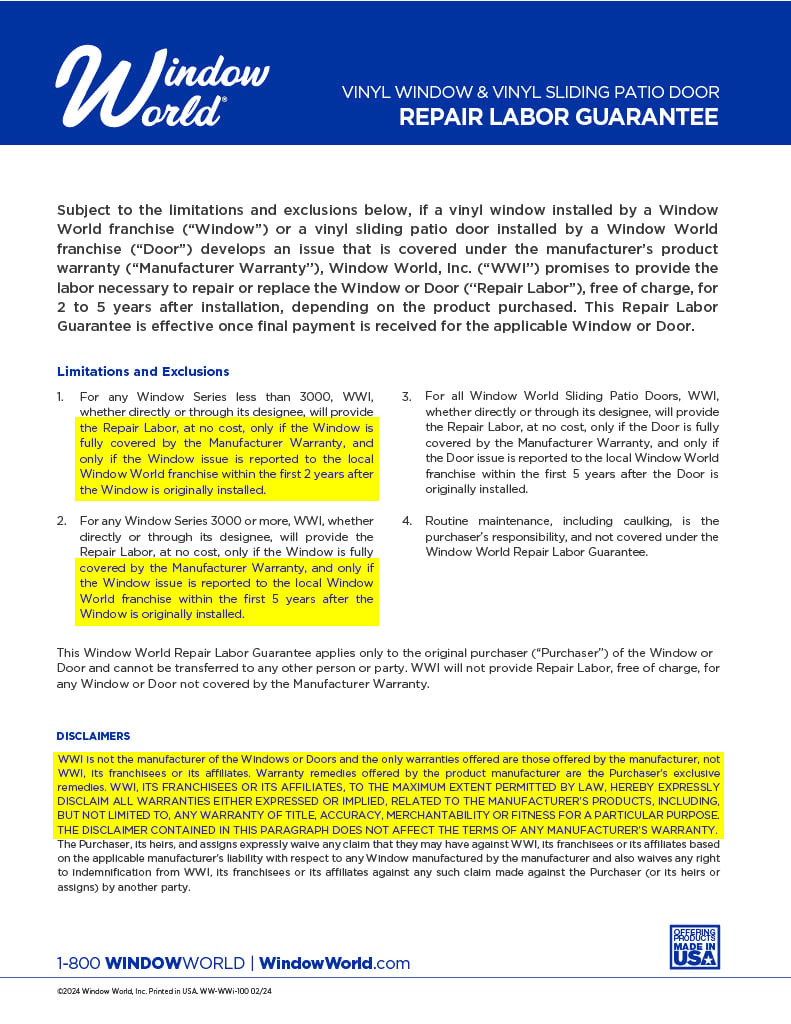
Are There Window Companies in Pittsburgh Known for Strong Warranties?
Yes, but you have to do your homework. Look for local companies that:
- Handle both the installation and services in-house.
- Have good online reviews for service after the sale.
- Provide the full warranty before you sign the contract.
- Avoid blame-shifting between the manufacturer and installer.
Of course, warranty is just one piece of the puzzle. If you want to see how Pittsburgh’s top window companies compare on installation, quality, and overall reputation, check out our list of Best Replacement Window Companies in Pittsburgh.
Once you’ve chosen the right company and warranty, it’s worth understanding what happens if you decide to sell your home. Let’s take a look at how warranty transfers work.
What Does Energy Swing Windows Warranty Cover?
Energy Swing is a single-source contractor. This means they are the company you sign with, they manufacture their own windows, and have their own in-house employee installers and service department. This gives them full-control over their warranty and what they can offer to homeowners.
Energy Swing offers a Triple Lifetime Warranty. Despite the name, the Triple Lifetime Warranty doesn't mean three lifetimes. It means that it covers the three key aspects of your investment—the product, the installation, and any necessary service for as long as you live in your home.
Can You Transfer a Window Warranty When Selling Your Pittsburgh Home?
Many window warranties allow you to transfer coverage to the next homeowner, but there are often rules and steps you need to follow.
Here’s what to know about making sure your warranty stays valid when selling your Pittsburgh home:
- Some warranties are transferable for some period of time
- Some require you to notify the company providing the warranty
- Some charge a small fee
- Others are void if you don’t file the transfer correctly
This can be a huge perk when selling your home in Pittsburgh’s competitive market. Buyers love peace of mind.
Whether you plan to stay in your home or eventually sell, it’s critical to spot warning signs before you commit. Here are some common warranty red flags to watch out for.
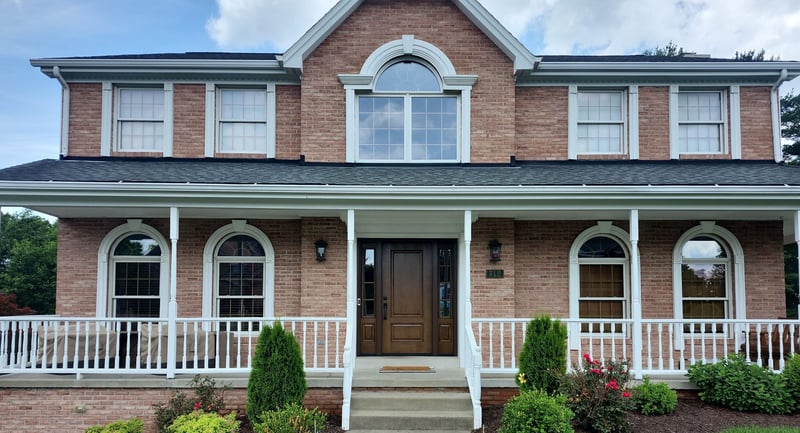
What Are the Red Flags in a Window Warranty?
Some warranties sound great… until you dig deeper. Certain phrases, vague terms, or missing details can signal trouble down the road.
Keep an eye out for these common red flags when reviewing a window warranty:
- “Lifetime” language with no clear definition
- Too many exclusions or vague terms
- Subcontracted installers with no accountability
- Warranties that require the installer to be certified to be valid
- Sales reps who won’t show you the actual warranty before the contract
Even with a good warranty in place, there are steps you can take to make sure you stay protected over time. Here’s how Pittsburgh homeowners can get the most out of their coverage.
How Can Pittsburgh Homeowners Make the Most of Their Warranty?
Even a great warranty won’t help if you don’t know how to use it. With a little preparation and regular care, you can avoid common pitfalls and keep your coverage in good standing.
Here are some simple ways Pittsburgh homeowners can protect their investment:
- Get a copy of the full warranty before you buy and spend time to read the small print to learn what is excluded
- Ask specific “what if” questions during the sales appointment
- Get key promises in writing
- Keep records, receipts, and photos of any issues
- Do regular maintenance (clean your tracks, lubricate locks, inspect for wear)
- Watch for early warning signs before they get worse
By now, you have a much clearer picture of what a strong window warranty looks like — and what it takes to protect your investment. Let’s wrap up with a few final thoughts.

What Warranty Peace of Mind Looks Like in Pittsburgh
At this point, you now have a much clearer understanding of what replacement window warranties in Pittsburgh really cover—and where the potential pitfalls lie.
Too many homeowners assume they’re protected, only to face unexpected costs when a seal fails or an installation issue arises. Reading the fine print and knowing the right questions to ask can save you frustration and money.
If you’d like even more guidance or want to explore options with a local company that handles both installation and warranty service in-house, schedule a free consultation with us at Energy Swing. We’ll walk you through exactly how our warranty works and help you choose the right windows with protection you can trust.
At Energy Swing, we’ve spent years helping Pittsburgh homeowners protect their homes and investments. We’d love to help you do the same.
Topics:














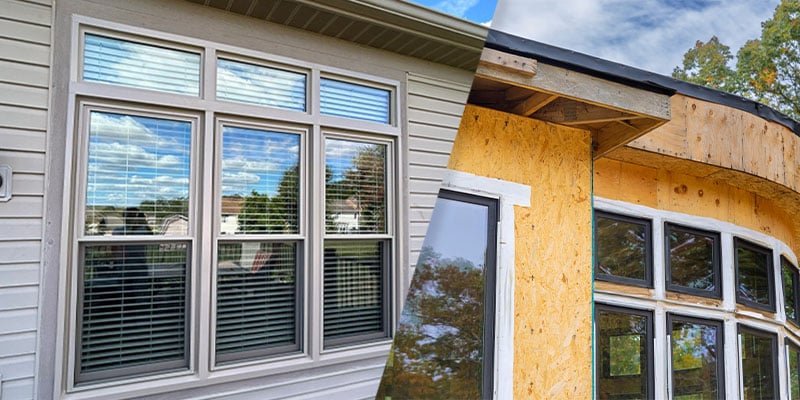
.jpg?width=1200&height=550&name=Copy%20of%20Copy%20of%20ESW%20Collage%20Template%20(3).jpg)
